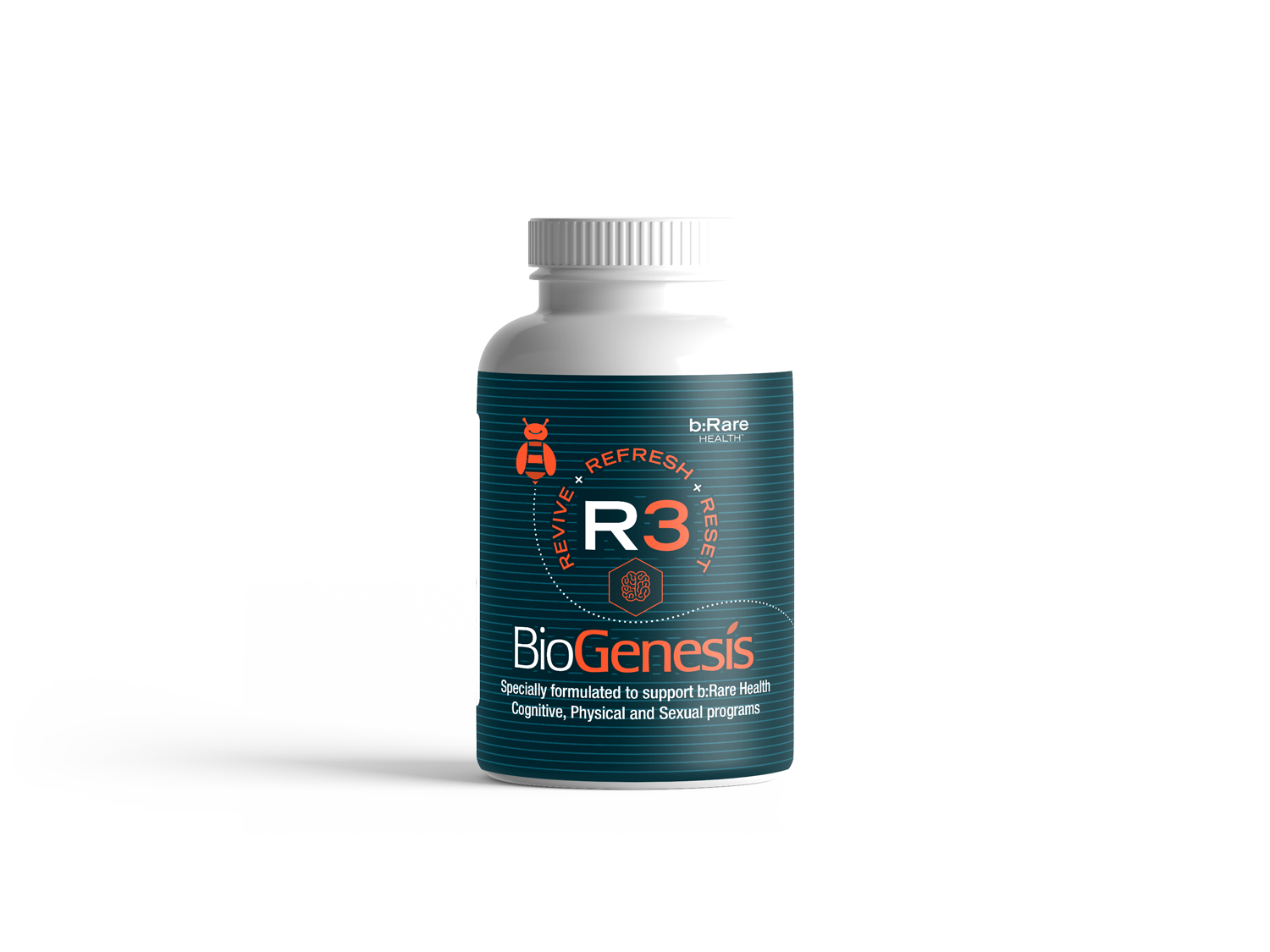Here are the five active ingredients in BIOGENESIS 2.0 and a brief description of the biochemistry and likely beneficial effects of each ingredient.
Quercetin
Quercetin is a plant-derived flavinoid found in fruits, vegetables, leaves and grains. Quercetin is a aglycone form of a number of other flavinoid glycosides, such as rutin and quercitrin, found in citrus fruit, buckwheat and onions. Quercetin forms the glycosides quercitrin and rutin together with rhamnose and rutinose, respectively. Quercetin is classified as IARC group 3 (no evidence of carcinogenicity in humans). Its role as an antioxidant is due in large part to its reactive linkage to glutathione (GSH metabolism).
Relevant Effectiveness
Quercetin appears to have three effects: (1) anti-inflammatory; (2) anti-oxidant; and (3) mitochondrial biogenesis.
Supportive Research
Anti-inflammatory Effects:
There is some evidence (Guardia 2001, Stewart 2008) that quercetin may have anti-inflammatory properties.
Anti-oxidant Effects:
There is some evidence (Boots 2008, Cai 2000, Stewart 2008) that quercetin may have anti-oxidant properties.
Mitochondrial Biogenesis:
Effects of quercetin on exercise tolerance in mice have been associated with increased mitochondrial biogenesis. Specifically (Davis 2009) an oral quercetin dose of 12.5 to 25 mg/kg increased gene expression of mitochondrial biomarkers and improved exercise endurance. There is some limited evidence (Davis 2010, Nieman 2010) that oral quercetin supplementation actually improves exercise performance in humans as well.
eNOS
Flavinoids in general, and quercetin specifically, stimulates they synthesis of eNOS (endothelial nitric oxide synthase) (Flesch 1998, Schmitt 2009).
Additional possible medicinal properties:
It has also been claimed that quercetin reduces blood pressure in hypertensive rats (Mackraj 2008) and obese subjects (Edwards 2007) in whom LDL cholesterol levels were also reduced (Egert 2009). An in vitro study showed quercetin and reservatrol combined inhibited production of fat cells (Yang 2008). A bioavailability study done on rates showed ingested quercetin is extensively metabolized into inactive phenolic acids, with more than 96% of the ingested amount excreted within 72 hours, indicating actual physiological roles, if they exist, involve quercetin in only minute amounts or require chronic administration (Mullen 2008).
Population studies provide some evidence that an acute (Gates 2007, Paliwal 2005, Ramos 2007, Ruiz 2007) or chronic increase in dietary flavinoids are associated with a reduced incidence of cancer (Neuhouser 2004, Murakami 2008, Nothlings 2007).
References
- Boots AW, GR Haenen, and A Bast. Health effects of quercetin: from antioxidant to nutraceutical. Eur J Pharmacol. 582(2-3):325-37, 2008
- Cai J, KC Nelson, M Wu, et al. Oxidative damage and protection of the RPE. Prog Retin Eye Res. 19(2):205-221, 2000.
- Davis JM, CJ Carlstedt, S Chen, et al. The dietary flainoid quercetin increases VO2max and endurance capacity. Int J Sport Nutr Exerc Metab. 20(1):56-62, 2010.
- Davis JM, EA Murphy, MD Carmichael, and B Davis. Quercetin increases brain and muscle mitochondrial biogenesis and exercise tolerance. AM J Physiol R296, 1071-7, 2009
- Edwards RL, T Lyon, SE Litwin, A Rabovsky, JD Symons, T Jalili. Quercetin reduces blood pressure in hypertensive subjects. J. Nutr. 137(11):2405-11, 2007.
- Egert S, A Bosy-Westphal, J Seiberl, et al. Quercetin reduces systolic blood pressure and plasma oxidised low-density lipoprotein concentrations in overweight subjects with a high-cardiovascular disease risk phenotype: A double-blinded, placebo-controlled cross-over study. Br J Nutr 102(7):1065-1074, 2009.
- Flesch M, A. Schwarz, and M Bohm. Effects of red and white wine on endothelium-dependent vasorelaxation of rat aorta and human coronary arteries. Am J Physiol. 275(4 Pt 2):H1183-90, 1998.
- Gates MA, SS Tworoger, JL Hecht, et al. A prospective study of dietary flavinoid intake and incidence of epithelial overian cancer. Int J Cancer. 121(10):2225-32, 2007.
- Guardia T. Rotelli AE, Juarez AO, Pelzer LE. Anti-inflammatory properties of plant flavinoids. Effects of rutin, quercetin, and hesperidin on adjuvant arthritis in rat. Farmaco. 56(9):683-687, 2001.
- Mackraj I, T Govender, and S Ramesar. The antihypertensive effects of quercetin in a salt-sensitive model of hypertension. J Cardiovasc Pharmacol. 51(3):239-45, 2008.
- Mullen W, JMRouanet, C Auger, et al. Bioavailability of [C-14 C]quercetin-4′-glucoside in rates. J Agric Food Chem. 2456 (24): 12127-37. 2008.
- Murakami A, H Ashida, and J Terao. Multitargeted cancer prevention by quercetin. Cancer Lett. 269 (2): 315-25, 2008.
- Neuhouser ML. Dietary flavinoids and cancer risk: evidence from human population studies. Nutr Cancer 50(1):1-7, 2004.
- Nieman, DC, AS Williams, RA Shanely, et al. Quercetin’s Influence on Exercise Performance and Muscle Mitochondrial Biogenesis. Med Sci Sprts & Ex 42(2):338-345; 2010.
- Nothilings U, SP Murphy, LR Wilkens, et al. Flavonols and pancreatic cancer risk. Am J Epidemiology 166 (8): 924-931, 2007.
- Paliwal S, J Sundaram, J, Mitragotri, S “Induction of cancer-specific cytotoxicity towards human prostate and skin cells using quercetin and ultrasound”. British Journal of Cancer 92 (3):499-502, 2005.
- Ramos S. Effects of dietary flavinoids on apoptotic pathways related to cancer chemoprevention. J Nutr Biochem. (7): 427-42. 2007.
- Ruiz PA, A Braune, C Holzlwimmer, et al. Quercetin inhibits TNF-induced NF-kB transcription factor recruitment to proinflammatory gene promoters in murine intestinal epithelial cells. J Nutr. 137(5):1208-15, 2007.
- Schmitt CA and VM Dirsch. Modulation of endothelial nitric oxide by plant-derived products. Nitric Oxide. 21(2):77-91, 2009.
- Stewart, LK, JL Soileau, D Ribnicky, et al. Quercetin transiently increases energy expenditure but persistently decreases circulating markers of inflammation in C57BL/6J mice fed a high-fat diet. Metabolism 57(7 Suppl 1), 2008.
- Winkel-Shirley, B. Flavinoid Biosynthesis. A Colorful Model for Genetics, Biochemistry, Cell Biology, and Biotechnology. Plant Physiol 126(2):485-493, 2001.
- Yang Jy, MA Della-Fera, S Rayalam, et al. Enhanced inhibition of adipogenesis and induction of apoptosis in 3T3-L1 adipocytes with combinations of reservatrol and quercetin. Life Sci. 82(19-20):1032-9, 2008.




Reviews
There are no reviews yet.